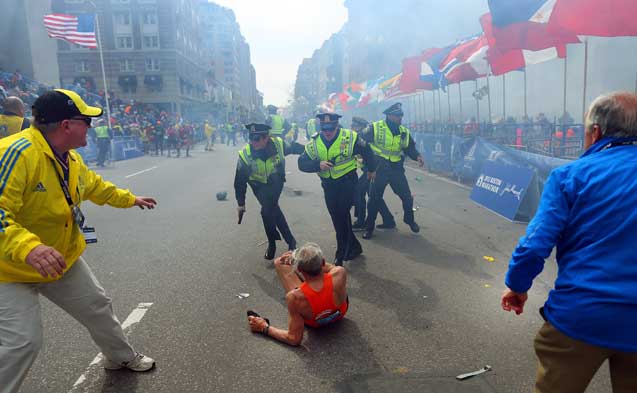
Boston – Boston was in mourning Tuesday for three killed and at least 144 wounded in a “cowardly” bombing at the Boston Marathon, leaving the tragedy-wracked city scrambling for answers as to how a terrorist was able to plant two explosive devices on a busy stretch of Boylston Street at a high-security international event.
“This cowardly act will not be taken in stride,” Boston Police Commissioner Edward F. Davis said. “We will turn over every rock to find those responsible.”
The 2:50 p.m. double bombing shattered the bliss of the sun-splashed marathon, sending frantic runners and fans scrambling for cover and sending at least 144 to the hospital. There were at least three dead _ including an 8-year-old _ and 30 wounded “critically,” officials said Monday night.
The FBI took over the investigation Monday night as President Barack Obama pledged to track down the ruthless killer or killers.
“We will get to the bottom of this. We will find out who did this and we will find out why,” Obama said. “They will feel the full weight of justice.
“Boston is a tough and resilient town. Residents will pull together, take care of each other and move forward,” he added. “The American people are with them every step of the way.”
FBI Special Agent-in-Charge Rick DesLauriers said the city should remain in a “heightened state of vigilance” Tuesday as an army of cops patrols the streets.
“It is a potential terrorist investigation,” DesLauriers said Monday night. “We will bring those responsible to justice as quickly as possible.”
Late Monday night, state police, Boston bomb squad and canine units, as well as FBI, ICE and ATF agents, swooped into an apartment complex in Revere. It was unclear whether the search was connected to the marathon bombings.
Downtown, the city was gripped by fear as revelers who came to celebrate wound up running for their lives. Roughly 15 blocks around Copley Square were “locked down” after the attacks and were slated to remain so Tuesday. Heavily armed National Guard soldiers, state troopers with bomb-sniffing dogs and hundreds of cops patrolled hotels, restaurants and the streets while shaken families huddled inside.
Officials said random bag searches would occur Tuesday on Massachusetts Bay Transportation Authority trains.
There were reports Monday night of a suspect in custody, but Davis said they were wrong. He did say there were “people being questioned,” but provided no more details.
Boston Mayor Thomas M. Menino, who was hospitalized with a broken leg, checked himself out of Brigham and Women’s Hospital Monday night to be at the city’s command post, where he met with Davis, Massachusetts Gov. Deval Patrick, and federal and state officials.
“The marathon is a great day in the city of Boston, but we had a tragedy,” Menino said from a wheelchair at the Westin Copley hotel. “I offer my condolences and prayers to the victims.”
Logan International Airport _ the launching pad for two of the planes in the Sept. 11, 2001, attacks in New York City _ was shut down for about an hour after the attack. A no-fly zone around Boston was put in place by the Federal Aviation Administration.
In a statement, the Boston Athletic Association, which organizes the marathon, said: “It is a sad day for the City of Boston. … What was intended to be a day of joy and celebration quickly became a day in which running a marathon was of little importance.”
Kyle Loehning of Charlestown arrived at Tufts Medical Center to see his sister-in-law, who was injured in the blast.
“She was in the wrong place at the wrong time,” he said. “They think she lost her leg.”
U.S. Rep. Stephen F. Lynch, a South Boston resident, said authorities believe the devices were brought into the area after police did a security sweep. He said city and state officials took “all the appropriate steps,” but security efforts in the future “will have to be redoubled.”
“There was nothing to lead us to believe that what we were doing, what the mayor was doing, what the governor was doing was less than appropriate,” Lynch said. “The staffing was there, the sweeps were there. … They did their due diligence. But … under these circumstances, it was very difficult to stop.”
Matt Stout and Tenley Rooney contributed to this report.
Distributed by MCT Information Services
(c)2013 Boston Herald
Visit the Boston Herald at www.bostonherald.com
Join us in defending the truth before it’s too late
The future of independent journalism is uncertain, and the consequences of losing it are too grave to ignore. To ensure Truthout remains safe, strong, and free, we need to raise $43,000 in the next 6 days. Every dollar raised goes directly toward the costs of producing news you can trust.
Please give what you can — because by supporting us with a tax-deductible donation, you’re not just preserving a source of news, you’re helping to safeguard what’s left of our democracy.